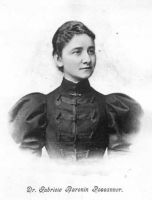Gabriele Possaner von Ehrenthal
First female scientist in Austria
“Due to her strength of purpose and the ability to overcome all obstacles she contributed considerably to enable women to study medicine.”
At the time Possanner was 20 she and her family had moved within the Austrian-Hungarian Empire for 6 times. Her father, a civil servant, became department head in the Ministry of Finance and the family settled down in Vienna. This enabled Possanner to attend the college of education first and to pass the external A-level exam at the academic secondary school then. However, to pursue her studies, she had to go to Switzerland, as women had not (yet) been granted access to universities in Austria.
From 1883 to 1893 she studied medicine in Zurich and Geneva. She chose medicine because she wanted to help people: „I was able to help much and yet to help is most beautiful!”, she said towards the end of her life. In 1894 she got her viva voce for practising as a medical doctor in all cantons of Switzerland. Yet, she wanted to come back to Vienna to practise there.
In Vienna a long way with many obstacles began: the recognition of her Swiss academic certificates was refused, a request for allowance of the study of medicine followed and she had to sit again all exams at the “Alma Mater” (University of Vienna). She preoccupied headmasters, ministers and gave in petitions at the House of Deputies until she finally – at the age of 37 - received her third (!) viva voce in 1897.The solemn ceremonial act was a sensation and attracted great attention in the press beyond the borders of Austria. From the audience she got both catcalls and much appreciation.
Dr. Reinisch’s speech (headmaster of the university) on the occasion of her graduation was being printed in the “Arbeiterzeitung of 8/1997” (journal for labourers). Below there a some excerpts from it:
“For the first time since our time-honoured Alma Mater has been existing the doctor’s degree is awarded and bestowed a lady. Therefore, I congratulate you, my highly honoured candidate, Misses Possanner, most heartily and give you my respectful appreciation ……”. “Moreover, I congratulate you as a courageous and victorious champion for the expansion of women’s rights. Although some individuals might have different opinions of this issue, every unbiased thinker will have to admit that the enlargement of the intellectual horizon of women will also raise the intellectual and moral level of the entire nation….”.
Now the way for being a successfully practising female doctor would have been paved. But both institutions and society had not yet been prepared for a woman as a doctor!
Though she opened an ordination immediately after her graduation and applied as an aspirant at the “Kronprinzessin Stephanie” hospital, she was only ranked forth behind her male colleagues until it would be her turn as a woman. It was her argument that women would prefer to be examined by her rather than by a male doctor that enabled her to achieve the position of a public health officer in Bosnia-Herzegovina for 2 years – after a mercy petition to the Emperor! Thus she was far away from Vienna and didn’t cause trouble any more. Until 1906 she was the only female medicine in the Austrian-Hungarian Monarchy. Her admittance to the medical association of Vienna was refused at first, as women were not allowed for in the statutes.
Her ordination – situated in the 9th district of Vienna, Alser Street 26 – only allowed her a modest living, due to the bad economic situation after World War 1and to the high inflation rates rather than her skills as a medicine.
In 1928 she was appointed to “Medizinalrat” (Medical Officer of Health), which was the greatest honour she received during her lifetime. The explanatory statement said: “By overcoming big obstacles, Misses Gabriele Possanner has put women on higher education and access to studies.” She died in 1940 and hardly anyone remembered this pioneer for 50 years.
It was only 100 years after her graduation that further homage was paid to her: In 1977 a national award carrying her name was established. A memorial tablet in Alser Street reminds of her. In Vienna, a park as well as a lane were named after her.
Sources:
- Heindl/Tichy, Hg., Stern Marcella in „Durch Erkenntnis zu Freiheit undGlück. Frauen an der Universität Wien, 2002, Vlg. Facultas-Online.
- Bologhnese-Leuchtenmüller/Horn, Hg.: „Töchter des Hippokrates“ 37-40, 2002, Vlg.ÖAK.
Photocredits:
Gabriele von Possaner, photograph in younger years, author unknown
Source: Picture Archive ONB with friendly permission of ONB (Austrian National Library) of 20.01.2014
http://www.fraueninbewegung.onb.ac.at/Pages/PersonDetail.aspx?p_iPersonenID=12360220




